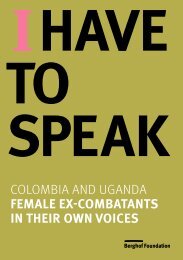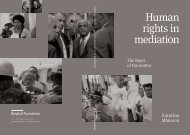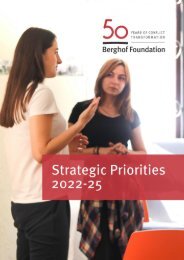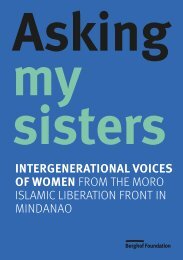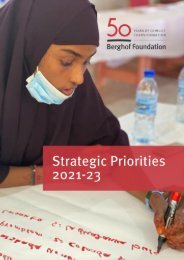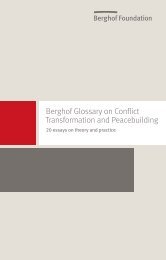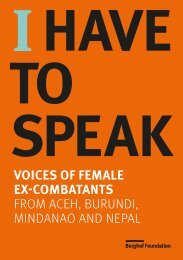Berghof Foundation: 50 years of conflict transformation
This book provides an overview of the Berghof Foundation’s work and impact over the past 50 years and sheds light on the challenges ahead of peacebuilding.
This book provides an overview of the Berghof Foundation’s work and impact over the past 50 years and sheds light on the challenges ahead of peacebuilding.
Create successful ePaper yourself
Turn your PDF publications into a flip-book with our unique Google optimized e-Paper software.
Building peace<br />
in Somalia,<br />
one Shir<br />
at a time<br />
Somalia is characterised by various types <strong>of</strong> <strong>conflict</strong><br />
that include clan rivalry and religious extremism. The<br />
lack <strong>of</strong> economic opportunities, poor governance<br />
and lingering insecurity in the country frustrate<br />
Somalis’ attempts to build a more peaceful society.<br />
Conflicts in Somalia <strong>of</strong>ten begin with disagreements<br />
between individuals and later escalate to clan-based<br />
violence. Much <strong>of</strong> the violence relates to disputes<br />
between communities around land and resources,<br />
and these <strong>conflict</strong>s have various historical roots and<br />
causes, many <strong>of</strong> which have never been addressed.<br />
The civilian population bears the brunt <strong>of</strong> the<br />
<strong>conflict</strong>s. This is also the case in the central states<br />
<strong>of</strong> Hirshabelle and Galmudug, where the <strong>Bergh<strong>of</strong></strong><br />
<strong>Foundation</strong> has been active since 2015.<br />
In such a context, a proactive approach<br />
<strong>of</strong> dialogue and mediation is indispensable to<br />
prevent violent <strong>conflict</strong>, and most importantly to<br />
improve the conditions that help sustain peaceful<br />
sociopolitical relations and coexistence. To achieve<br />
this, the <strong>Bergh<strong>of</strong></strong> <strong>Foundation</strong> has been using<br />
inclusive community dialogue assemblies, or<br />
Shirarka. Each large-scale Shir allows members<br />
<strong>of</strong> the public the space and opportunity to discuss<br />
their concerns about various topics. The event<br />
takes place over a period <strong>of</strong> six days and involves <strong>50</strong><br />
participants from all relevant segments <strong>of</strong> society,<br />
“<br />
The community has gained<br />
a lot because everyone’s<br />
opinions were considered in the<br />
discussions and it has produced<br />
applicable results, which help in<br />
resolving <strong>conflict</strong>s in Balad.<br />
Ugaas Mohamed Weli Islow Hussein<br />
Traditional elder and co-facilitator<br />
<strong>of</strong> the Balad dialogue assembly<br />
2015–present<br />
including elders, religious leaders, members <strong>of</strong> the<br />
business community, journalists, women and youth<br />
representatives, artists and poets.<br />
The aim <strong>of</strong> the Shirarka is to create an open<br />
and inclusive platform where the people can feel free<br />
to discuss pertinent issues in their communities and<br />
society. The platforms give them a chance to come up<br />
with ideas to transform local <strong>conflict</strong>s, and through<br />
mechanisms that we have created within the project,<br />
these ideas and perspectives are then channelled<br />
to decision-makers at the state and national levels.<br />
Over the <strong>years</strong>, this format has proven to be a wellreceived<br />
tool for fostering local ownership and<br />
articulating local views on <strong>conflict</strong> and peace.<br />
The participants have the opportunity to learn about<br />
others’ perspectives, which builds empathy and<br />
strengthens social cohesion.<br />
Topics addressed at the Shirarka over the<br />
<strong>years</strong> include approaches to <strong>conflict</strong> resolution<br />
and <strong>transformation</strong>, mediation initiatives, in-depth<br />
<strong>conflict</strong> analysis, federalism and the federalisation<br />
process in Somalia, reconciliation support, and<br />
preventing revenge killings. In upcoming Shirarka,<br />
we will address the impact that climate change<br />
has on (community) <strong>conflict</strong>. These discussions<br />
should increase recognition <strong>of</strong> the climate crisis and<br />
its impact on <strong>conflict</strong> and peace in Somalia, while<br />
supporting the development <strong>of</strong> ideas for how to<br />
address and reduce the impact <strong>of</strong> climate change.<br />
The people who take part in the Shirarka are<br />
active and engaged individuals in their communities<br />
and they are encouraged to guide discussions on<br />
these thematic matters when they return home. They<br />
act as multipliers in their communities, and the topics<br />
<strong>of</strong> the Shirarka thus reach a wide range <strong>of</strong> people in<br />
Hirshabelle and Galmudug, both geographically and<br />
with regard to different social groups.<br />
The events are carried out in close<br />
cooperation with the authorities from Hirshabelle<br />
and Galmudug States and their district-level<br />
authorities. This cooperation with the authorities<br />
builds the visibility and credibility <strong>of</strong> the government<br />
within a federal system. The diverse perspectives<br />
on <strong>conflict</strong> that are voiced at each <strong>of</strong> the assemblies<br />
are then linked to policy- and decision-makers at the<br />
government level. These assemblies thus contribute<br />
greatly to the mutually reinforcing processes <strong>of</strong><br />
reconciliation and statebuilding while increasing<br />
social cohesion. Moreover, through these events,<br />
the concepts <strong>of</strong> mediation and reconciliation have<br />
become more mainstreamed in Somali society and<br />
have been received with great interest on the part<br />
<strong>of</strong> the community and government. Reconciliation<br />
among the communities and clans in Somalia is seen<br />
as an essential element for successfully building a<br />
prosperous and peaceful federal state.<br />
“<br />
When I go back, I will share<br />
with them what I’ve learned<br />
from the debates: the root<br />
causes <strong>of</strong> <strong>conflict</strong>s and how to<br />
resolve them. All <strong>of</strong> this has very<br />
much influenced my life and that<br />
<strong>of</strong> the people around me.<br />
Ishmael Geedi Hassan<br />
Shirarka participant and member<br />
<strong>of</strong> a Somali youth organisation<br />
48<br />
49




